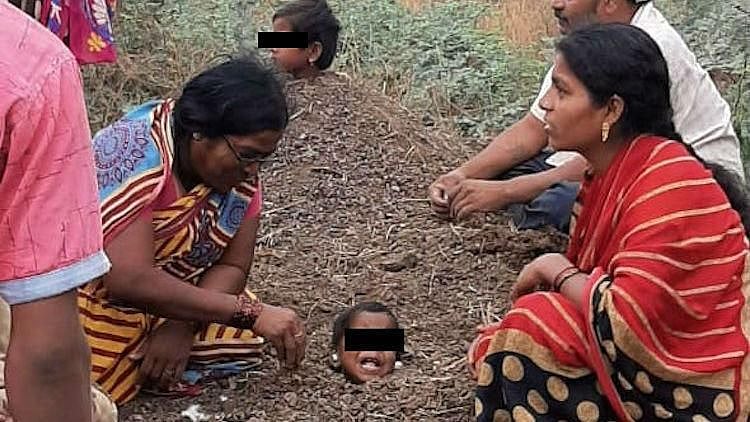
Karnataka’s ‘Buried’ Kids: Faith Eclipses Anti-Superstition Law
It is a common belief that disabled children can be cured by the heat generated from the sun during an eclipse.

advertisement
When parts of India were witnessing the last solar eclipse of the decade, a four-year-old differently abled child was left unconscious after her family members buried her neck-deep in a compost pit for hours in Taj Sultanpur village, Gulbarga district of north Karnataka. Two more handicapped children were made to undergo the same ‘mud treatment’.
It is a common belief in north Karnataka that children with physical or mental disabilities can be cured by the heat generated from the sun during an eclipse. And this has existed for ages.
Last week’s incident was only a replay of what happened in 2009 in the same district when around 60 children were reportedly buried neck-deep during an eclipse.
Dropping babies from temple-top and putting them before the wheels of speeding chariots are some of the perturbing traditions popular in the region.
This is despite an Anti-Superstition Law in the state that specifies punishment for “facilitating rituals involving harm inflicted on children in the name of curing them”.
The solar eclipse on 26 December was the last solar eclipse of the decade and it was visible from India, Middle East, Sri Lanka, Philippines, and Indonesia.
‘Parents Were Desperate and Poor’
Blaming the state government’s ineffectiveness, women rights activists involved in the rescue of the children in Gulbarga say they won’t be registering a case against the parents.
Neela K from the All India Democratic Women’s Association tells The Quint that two of the three disabled children belong to economically backward families who cannot afford medical treatment.
Police officials at Gulbarga Rural Police Station told The News Minute that a case will not be registered unless a complaint is made by the activists.
“In 2009, we held awareness camps in the village where the incident was reported. In that village, things are fine. We have assessed the situation at Taj Sultanpur village now, where the latest incident has been reported from, and we will be organising a ‘vaigyanik andolan’ in the coming week,” Neela K adds.
Rationalist Narendra Nayak, who rallied for the passing of the Karnataka Anti-Superstition Bill, added, “Of course, the parents have done it in the best of their intentions. I have seen a video in which a mother is consoling her buried child. They did not do it to cause any harm to the children but out of misconceptions and lack of education.”
The Child Welfare Committee of the district can send a suo moto notice against the parents, he adds.
However, Avinash Patil, state executive president of the Maharashtra Andhashraddha Nirmoolan Samiti (MANS), tells The Quint that his organisation will send a letter by next week to the Karnataka chief minister demanding legal action against the parents for violating child rights and on the basis of the Anti-Superstition Law.
What The Karnataka Anti-Superstition Law Says
At present, Maharashtra and Karnataka are the only Indian states to have specific laws to prevent black magic and human sacrifices.
The Karnataka Prevention and Eradication of Inhuman Evil Practices and Black Magic Bill, which aims to “protect people from evil and sinister practices”, was passed after much opposition — and several amendments — in 2017. Terming ‘anti-Hindu’, the Bharatiya Janata Party had alleged that the Bill hurts the religious sentiments of the Hindu community.
Nayak tells The Quint that though the law is a diluted version of what was initially proposed, it has not been implemented at all.
“Not a single FIR has been lodged in Karnataka under the Law since it has been passed. We have been writing letters to the state government demanding its implementation,” Patil says.
- Section 2 of the Anti-Superstition Bill mentions “commission of any act of inhuman, evil practices and black magic and any advertisement, practice, propagation or promotion of inhuman, evil practices and black magic” as a punishable offense.
- The bill mentions 23 superstitious practices including human sacrifice and firewalks.
- It does not consider the consent of the victim as a defence.
- The offence is cognisable and non-bailable, with the guilty to be punished with imprisonment for a term not less than one year which may extend to seven years and with fine, not less than Rs 5,000 which may extend to Rs 50,000.
‘Not About Act, About Attitude’
On the day of the solar eclipse, Nayak along with members of other like-minded organisations had organised a swimming-and-eating-during-eclipse event in Mangaluru. A common superstition around eclipses is that if people eat and take a bath during an eclipse, they attract sins.
(At The Quint, we question everything. Play an active role in shaping our journalism by becoming a member today.)
- Access to all paywalled content on site
- Ad-free experience across The Quint
- Early previews of our Special Projects
Published: 30 Dec 2019,07:22 PM IST